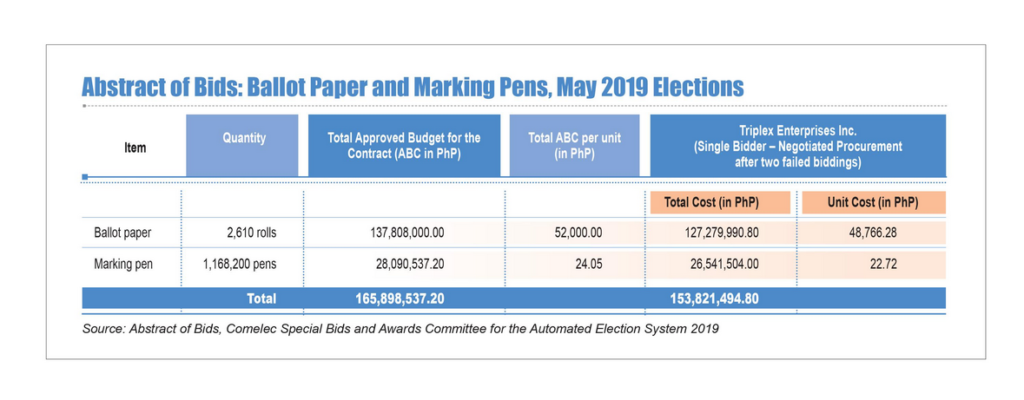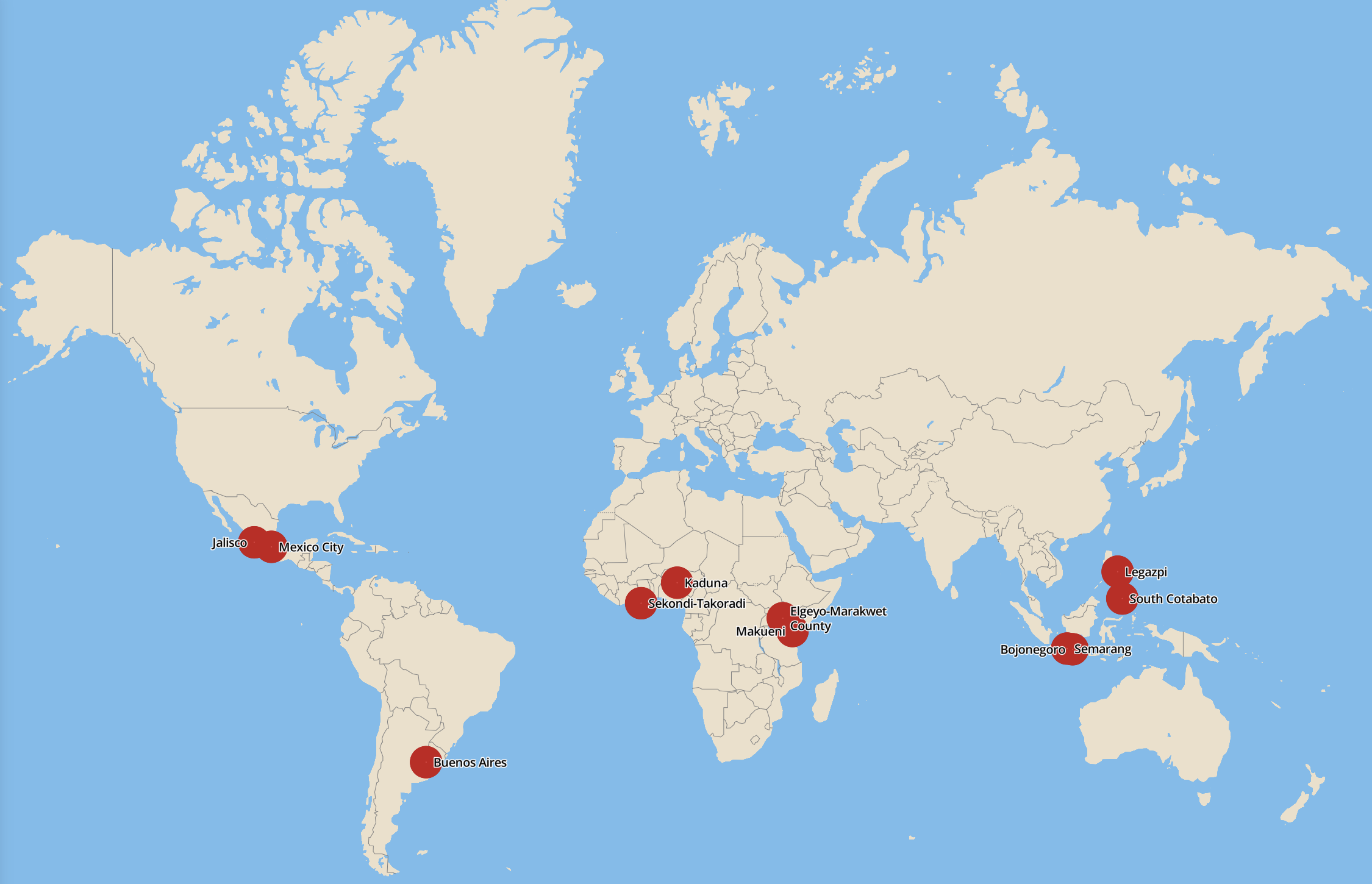Struggling to be ‘sexy’: Reporting contracting amid competing news values in the Philippines
By Adelle Chua
In a series of stories published August 2019, the Philippine Center for Investigative Journalism reported that aside from the publicly acknowledged mishaps during elections that previous May – the 3,414 vote counting machines (VCMs) that had malfunctioned, the 4,067 SD memory cards that had been found defective, and the countless marking pens that had bled on the thinner-than-usual ballot paper – the poll was fraught with many other incidents of inefficiency, wasteful spending and other operational blunders not known to many.
Other mishaps included preventable delays in the procurement of goods and services; a new ballot layout which placed party-list choices at the back of the paper which caused massive and unprecedented undervoting; and defective Voters’ Registration Verification Machines (VRVMs).
Because of the delays, the contract for the marking pens (P26.54 million) and ballot paper (P127.28 million) was awarded in a negotiated procurement to the sole participating contractor that had already been disqualified in a prior bidding.

The PCIJ also found that the gross failure of the VRVMs’ pilot testing in more than 32,000 precincts was actually due to last-minute system changes implemented by the supplier; these changes were not reflected in earlier instructions given to members of the Board of Election Inspectors. This was contrary to the Election Commission’s claim that the failure was due to the inspectors’ confusion about operating the machines.
By any standard, these findings are shocking and you would expect any Filipino taxpayer to be stunned at how their money was wasted.
There was no such outrage.
Documents and insights
The 2019 elections series is the second such undertaking by the PCIJ under its partnership with Hivos-Open Contracting. The Hivos program pushes for transparency by making civil society and the general public involved in what is going on in the public bidding process.
The first series, published in September last year, exposed how the family of then-Presidential Assistant Christopher Lawrence “Bong” Go, through the company CLTG Builders, benefited from billions of pesos worth of public works contracts in the Davao region while failing to complete projects of that magnitude. Go was elected senator in May, anyway.
Since 2019 was an election year, the PCIJ received numerous suggestions to look into preparations for and conduct of the polls in an attempt to explain the glitches. The conduct of elections, after all, more than the names and parties of candidates who won and lost, is the truly central issue in any democracy.
Karol Ilagan, senior reporter of the PCIJ, says that they encountered few difficulties when obtaining contract documents from the Election Commission. Mostly, the challenges were in the form of waiting for some units to get pertinent data from other departments. The release of data had to be approved.
On the whole, however, the Election Commission was cooperative. “Surprisingly, they granted all our requests – the contracts, the pre-procurement meeting minutes, pre-bid conference minutes, test specifications, information on the SD cards. Because the Comelec is a commission, all the big contracts were subject to en banc discussions. They talk about these decisions, and because the minutes and resolutions are public documents, they give you insights on what was actually taking place in the minds of commissioners during that time.”
While they were examining the documents that covered planning, tender awards, and implementation, Ilagan’s team soon found that the failures during election day were a combination of problems that were not even being discussed in the news: Instead, what was making headlines were voters’ anecdotal complaints about how difficult it was for them to vote.
Ilagan says: “Comelec staff members told us: ‘Why are you looking at the SD cards? That’s a small issue. Look instead at the VRVM.”
“In the end, it became very clear that what happened was a planning issue,” Ilagan says. Plain mismanagement led to gross wastage and undue delays.
Upstaged
There were five news organizations that carried the PCIJ’s election stories. And yet the uptake among the general public was not as great as they had hoped.
One of the explanations Ilagan can think of is that the series’ release coincided with the controversy involving Ronald Cardema, the former chairman of the National Youth Commission who had asked to be substituted for his wife as nominee for Duterte Youth, a party-list group, which won a seat in Congress. Cardema’s substitution plea was audacious because he was 34 years old – the law states youth representatives must not be older than 30 – and because he did not quit his executive post while campaigning, allowing him to take advantage of the perks of his incumbency.
Cardema and one of the Comelec’s commissioners, Rowena Guanzon, traded personal insults on Twitter, which trended in the news and on social media channels. The resulting controversy overshadowed the fundamental constitutional issue raised by Cardema’s actions.
More importantly, this indicated that reports on contracts and processes, no matter the violation, still take a backseat compared to political quarrels where personalities quarrel, blame, or accuse one another of wrongdoing.
A ‘data state of mind’
The opportunities for reporting on open contracting are countless. Any beat, any agency of government deals with contracts. It’s all year round, because government needs suppliers all the time.
Thus in September 2019, the PCIJ conducted a four-day bootcamp on Investigating Contracts among 25 journalists and members of civil society organizations.
Ultimately, the PCIJ seeks to shatter myths about reporting on public procurement.
There appears to be considerable hesitation and a feeling of inadequacy among journalists when dealing with numbers and data. “Generally we are averse to numbers. But we can’t escape them. It is important to cultivate a data state of mind,” Ilagan says.
And while many journalists appreciate just how important reporting contracts is, many feel that with the constant demands of their regular jobs on this 24/7 news cycle, they will not be able to have the time and inclination to undertake projects such as this. The good news is that it’s not as difficult or complicated as it’s made out to be. Not all reports on contracting have to take on a long form or take months of deep research.
She says, “We want to impart to journalists that even for a spot report, open contracting knowledge will allow them to add value by using easily obtainable information they don’t even have to request or wait long for.”
For instance, one can go beyond reporting the name of a company as the winning bidder for a government contract. Using information that is readily available at the government portal, a journalist can make the report richer by looking at the people behind that company, its financial capability and track record. “Usually it has to be uploaded. If it’s not there, then that’s a red flag in itself.”
Reporters might initially balk at the idea of reporting contracts because agencies may refuse to provide the records they request. Access to public records in the Philippines remains problematic. Foremost, there is no Freedom of Information law. And while President Dutere issued Executive Order 2, this applies to the Executive Department only.
In the absence of these, journalists have to be resourceful and know where and how to look.
Some agencies do respond, Ilagan says, but the situation varies from agency to agency. Fortunately, RA 9184, the Government Procurement Reform Act which sets the standards for a more transparent procurement process, is there, and it is the reason we have PhilGEPS. This law made getting contracting documents possible.
Unfortunately, people only stand up and take notice when big personalities and scandals are involved. In turn, journalists themselves are burdened with so many prior notions about how difficult, and quixotic, this kind of reporting could be.
“There is really no easy way to report on contracting, but it can be done,” Ilagan says.
The PCIJ does this undoubtedly well, but to make a greater dent among the general public, more and more journalists have to emboldened and empowered to do the same.






